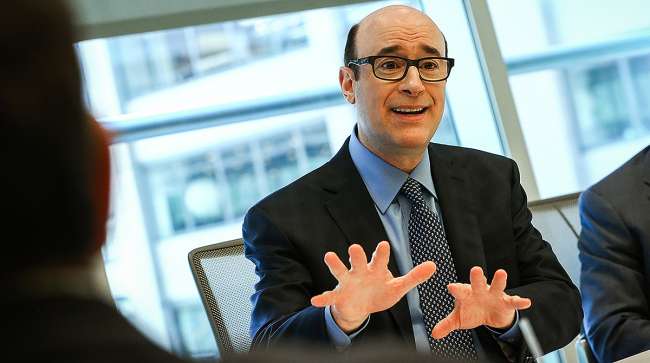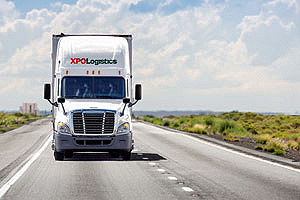Senior Reporter
CEO Brad Jacobs Looks to Grow XPO, According to Analysts

[Stay on top of transportation news: Get TTNews in your inbox.]
Brad Jacobs built XPO Logistics through aggressive mergers and acquisitions over the past eight years, only to cool to purchasing other companies. The high-profile CEO now appears to be back in acquisition mode.
According to notes from an analysts meeting with Morgan Stanley obtained by Transport Topics, Jacobs said he now is spending 10% to 15% of his time looking at possible transactions.

XPO Logistics
The Morgan Stanley analysts wrote, “As XPO starts to lap its tough six-month stretch from a year ago, we believe management’s swagger is returning, and so is our confidence in the narrative.”
Jacobs’ time spent considering acquisitions may not seem like a considerable amount given the company’s aggressive history, but it does mark a significant change from just in February when he said the amount of time spent contemplating purchases was zero.
Then, the Greenwich, Conn.-based firm said it was putting on hold any M&As for the foreseeable future after its stock slid in December. XPO decided that with the stock at a lower price, it made sense to use its cash to buy back as much stock as possible. To date, the company has spent about 75%, or $1.9 billion, of the $2.5 billion it had set aside to buy back stock.
Still, with Jacobs now looking at future purchases, that’s down from 50% of his time beginning in September 2011 when he joined the company. At the time, XPO rapidly began buying businesses and transformed from a $100 million-a-year operation to a nearly $17.3 billion enterprise in 2018. From 2011 to 2015, XPO acquired and integrated 17 companies. Its most recent purchase was in September 2015, when it bought logistics and transport company Con-way for $3 billion.
According to the Morgan Stanley note, XPO is likely to focus its attention on smaller companies, rather than larger operators, and individual opportunities rather than those that were “already in the pipeline.” The note also said it likely will stay clear of freight forwarding operations because of secular disruptions in that market.
It also is unlikely XPO would increase its debt level or issue equity to finance a potential purchase. Based on the note, Jacobs and XPO’s director of investor relations, Tavio Headley, told the analysts the company is in the early stages of discussions with possible companies to purchase, and conducting “fact-finding” and “relationship-building” activities.
Jacobs also commented on the economic conditions in the trucking and logistics industry saying demand will remain sluggish until the status of trade talks between the U.S. and China becomes more defined and the situation in the United Kingdom stabilizes regarding Britain’s possible exit from the European Union.
The company says it is determined to improve its efficiency and sees the potential for hundreds of millions of dollars in savings through route optimization and increased warehouse automation. XPO spends $6.5 billion annually on labor costs and in its LTL operations, and management said it wants to optimize hiring with shorter shifts and finding the right labor mix, with regard to drivers and dockworkers.
XPO’s stock price has fluctuated wildly over the past 52 weeks, peaking at $115 per share in September 2018 and falling to $41 per share earlier this year in the wake of several quarters of disappointing financial results, as well a report in December 2018 questioning the company’s accounting methods and managerial competence.
XPO closed at $70.52 on the New York Stock Exchange on Sept. 27.
34 XPO drivers made it to this year's National Truck Driving Championships, and we couldn't be prouder of the talent and perseverance they've exhibited. In case you weren't able to see the event in person, we've got highlights of all the action! #NTDC2019 #WeAreXPO pic.twitter.com/Js5QaXExug — XPO Logistics, Inc. (@XPOLogistics) September 19, 2019
In May, the Teamsters union clashed with Jacobs, saying shareholders had lost confidence in his ability to run the company. That same month, however, Jacobs received a vote of confidence when he was re-elected to the board of directors.
XPO Logistics on Aug. 1 reported mixed financial results for the second quarter.
Net income dropped to $145 million from $159 million a year ago, but earnings per share was up sharply, to $1.32 compared with $1.14 in the 2018 period.
Net income for the first six months of 2019 was $197 million compared with $238 million last year. The six-month price per share was $1.66 compared with $1.70 in 2018.
However, the company’s operating ratio improved to 80.3 from 84.3 a year ago. Operating ratio, or operating expenses as a percentage of revenue, is an industry metric used to measure efficiency. The lower the ratio, the greater the company’s ability to generate profit.
Neither Jacobs nor other company executives responded to requests for comment concerning the Morgan Stanley note.
XPO ranks No. 1 on the Transport Topics Top 50 list of the largest logistics companies in North America and No. 3 on the Transport Topics 100 list of the largest for-hire carriers.
Want more news? Listen to today's daily briefing:

